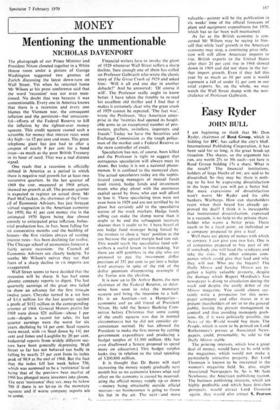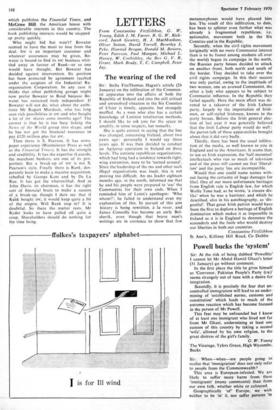Easy Ryder
JOHN BULL
I am beginning to think that Mr Don Ryder, chairman of Reed Group, which is bidding for IPC. has called the city's bluff. International Publishing Corporation, it has been said for so long, is the great break-up situation. The shares, so the argument has run, are worth 25s to 30s each—yet here is Reed Group bidding 17s a share. What is the result? The financial institutions, holders of large blocks of IPC, are said to be dissatisfied. So they may be; there is noth- ing to be lost by expressing dissatisfaction in the hope that you will get a better hid. But mere expressions of dissatisfaction won't worry Mr Ryder and his able bankers, Warhurgs. How can shareholders resist when their board has already ap- proved the deal? I think it is inescapable that institutional dissatisfaction, expressed in a vacuum, is no help to the private share- holder who wants a better price. There needs to be a focal point, an individual or a company prepared to give a lead.
Well there are plenty of names with which to conjure. I can give you two lists. One is of companies prepared to buy part of 1PC if somebody else will head the syndicate and take the risks. 'The other contains com- panies which could give that lead and why they will not. Who are the buyers? The Daily Mirror and Sunday Mirror are to- gether a highly valuable property, despite the damage which Rupert Murdoch's Sun newspaper is doing to circulation during the week and despite the costly debut of the Mirror magazine. You could almost cer- tainly write a prospectus for this news- paper company and offer shares in it to present shareholders of IPC or to the general public, leaving the present management in control and thus avoiding monopoly prob- lems. Or, if it were politically possible, the News of the World would buy them. The People, which is soon to be printed on Lord Rothermere's presses at Associated News- papers. could, presumably. be sold to the Daily Mirror stable.
The printing interests, which lose a great deal of money, would have to be sold with the magazines, which would not make a particularly attractive property. But Lord Thomson is known to be interested in the women's magazine field. So, also, might Associated Newspapers be. So is Mr Sam Newhouse. the American publishing tycoon. The business publishing interests, which are highly profitable and which have first-class prospects, would attract Lord Thomson again; they would also attract S. Pearson.
which publishes the Financial Times, and McGraw Hill. the American house with considerable interests in this country. The book publishing interests would be snapped up pretty quickly.
Who might bid but won't? Bowater seemed to have the most to lose from the deal. IPc is an important customer and whatever assurances may be given, Bo- water is bound to find its IPC business whit- tled away in favour of Reed—or so one would have thought. But Bowater has decided against intervention. Its position has been protected by agreement reached under the auspices of the Industrial Re- organisation Corporation. In any case it thinks that other publishing groups might now prefer Bowater to Reed because Bo- water has remained truly independent. If Bowater will not do, what about the ambi- tious Mr Rupert Murdoch, who has long seen rich possibilities in IPC and who bought a lot of IPC shares some months ago? The answer is that he is too busy licking the News of the World group into shape; and he has not got the financial resources to pay £120 million plus for IPC.
Then there is S. Pearson. It has news- paper experience (Westminster Press as well as the Financial Times). It has the strength and credibility. It has the expertise (Lazards, the merchant bankers, are one of its pro- perties). But a break-up of IPC is not S. Pearson's style. Finally there is Rank, des- perately keen to make a massive acquisition, rebuffed by George Kent and by De La Rue. It has got the wherewithal. And in John Davis, its chairman, it has the right sort of financial brain to make a success of a break-up, though I dare say that if Rank bought 'Pc, it would keep quite a bit of the empire. Will Rank step in? It is doubtful. So there the matter rests. Mr Ryder looks to have pulled off quite a coup. Shareholders should do nothing for the time being.
ffolkes's taxpayers' alphabet I is for III wind



































 Previous page
Previous page